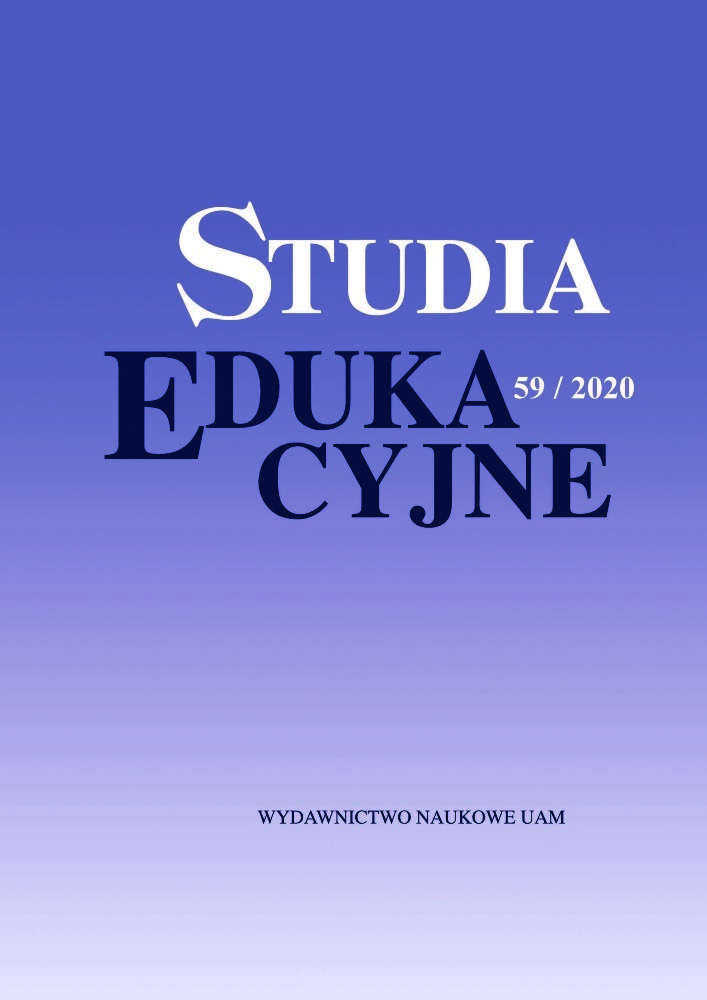Abstrakt
The text is devoted to the significance and genesis of doctoral degree and historical contexts of doctorate’s award ceremony. Next, the statistics on doctorate recipients by broad field of study and sex has been analysed. Also the types of doctorate has been described. The ultimate conclusion refers to the conviction that, notwithstanding the raised controversy, obtaining a doctoral degree is a turning point in the academic and socio-professional career of young people.
Bibliografia
Bourner T., Bowden R., Laing S., Professional Doctorates in England, Studies in Higher Education, 2001, 26, 1.
Clark W., On the Ironic Specimen of the Doctor of Philosophy, Science in Context, 1992, 5, 1.
Cyranoski D., Gilbert N., Ledford H., Nayar A., Yahia M., Education: The Ph.D. Factory, Nature, April 2011, 21, 472, s. 276-279, https://www.nature.com/news/2011/110420/pdf/472276a.pdf
Fillery-Travis A., Introduction, Studies in Higher Education, 2018, 43, 5.
Frijhoff W., Graduation and Carieers, [w:] History of the University in Europe, vol 2 – Universities in the Middle Ages (1500-1800), red. H.D. Ridder-Symeons, Cambridge 2003.
Golde Ch.M., Walker G.E. (red.), Envisioning the Future of Doctoral Education. Preparing Stewards of the Discipline. Carnegie Essays on the Doctorate, San Francisco 2006.
Grzesiak E., Społeczne konstruowanie rytuałów i symboli akademickich, Studia Edukacyjne, 2019, 53.
Huisman J., Naidoo R., The Professional Doctorate: from Anglo-Saxon to European Challenges, Higher Education Management and Policy, 2006, 18, 2. James W., Ph. D. Octopus, 1903.
Kandel I.L., The Ph. D. Degree. The Need for Redefining Standards and Purposes, The Journal of Higher Education, May 1939, II.
Kang K., The Survey of Earned Doctorates, The National Science Foundation, https://ncses.nsf. gov/pubs/nsf20301/data-tables/
Kehm B.M., Bao Y., Ma Y., From product to process: the reform of doctoral education in Europeand China, Studies in Higher Education, 2018, 43(3).
Noble K.A., Changing Doctoral Degrees: An International Perspective (Society for Research into Higher Education), McGraw-Hill 1994.
OECD Science, Technology and Industry Scoreboard. Innovation for growth and society, Paris 2015, https://www.oecd-ilibrary.org/science-and-technology/oecd-science-technology-and-industry-scoreboard-2015/new-doctoral-degrees-awarded-to-women-inoecd-countries-by-field-of-education-2005-12_sti_scoreboard-2015-graph57-en
Park Ch., Redefining the Doctorate, 2007, https://www.lancaster.ac.uk/staff/gyaccp/RedefiningTheDoctorate.pdf
Parry S., Discipline and Doctorates, Dordrecht 2007.
Raport OECD, Education at Glance 2019, Indicators OECD Publishing, Paris 2019, https://assets.documentcloud.org/documents/6394949/Education-at-a-Glance-2019.pdf
Rashdall H., The Universities of Europe in the Middle Ages, vol. 1, Oxford 1895.
Rocznik Statystyczny GUS, Szkoły wyższe i ich finansowanie, Gdańsk 2019, s. 25; 216-217, https://stat.gov.pl/obszary-tematyczne/edukacja/edukacja/szkoly-wyzsze-i-ich-finanse-w-2018-roku,2,15.html
Rosenberg R., Eugene Schuyler’s Doctor of Philosophy Degree: A Theory Concerning the Dissertation, The Journal of Higher Education, 1962, 33, 7.
Sinclair J., How the Doctorate Contributes to the formation of the active researches: what the research tell us, Studies in Higher Education”, 2014, 39, 10.
Verger J., Teachers, [w:] History of the University in Europe, vol 1 – Universities in the Middle Ages, red. H. De Ridder-Symeons, Cambridge 2003.
Walters E., The Prestige of Ph.D. Degree, The Journal of Higher Education, 1962, 33, 3.
